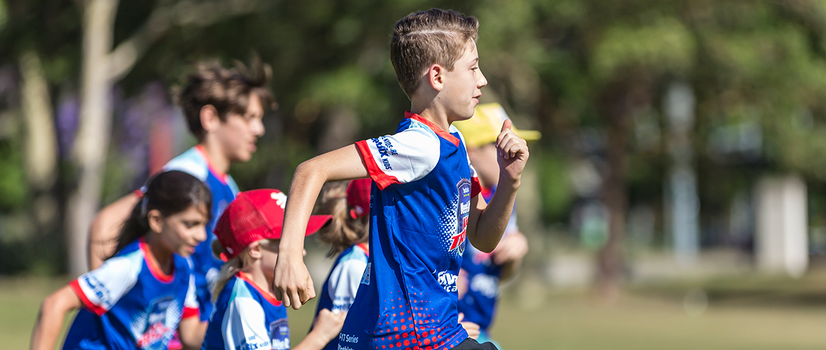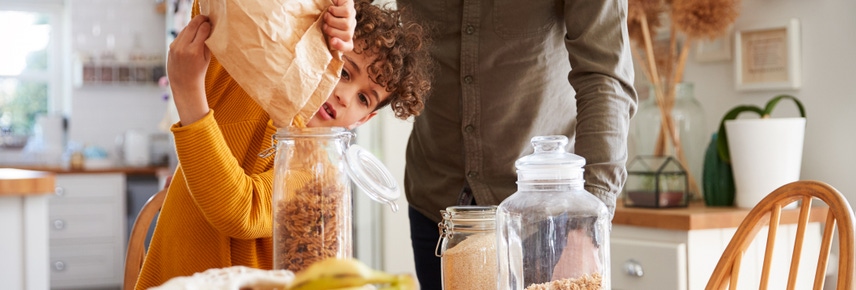
Healthy bodies, healthy minds: how good physical health helps kids thrive
Have you battled through hangry mood swings, lack-of-sleep temper tantrums, or sugar-rush rollercoasters?
And we’re not just talking about taming toddlers. Many of us have experienced first-hand the impact of food, sleep and exercise, or lack of it, on our kids or ourselves - and in turn the impact it has on our whole family.
There’s no doubt our physical and mental health are closely connected.
It’s simple really, when we eat well and lead an active lifestyle – we feel good inside and out! But when things get in our way, our mood, concentration and ability to cope can be impacted.
The Weet-Bix™ Feed The Belief Report, informed by a range of leading parenting, psychological and nutrition experts, highlights that caring for a child’s physical health is one of the most impactful ways you can help protect and nurture their mental health, with positive benefits to optimism, self-esteem and overall feelings of wellbeing.
For children and teens, a healthy diet, physical activity and quality sleep are critical for optimal growth and development. Importantly if good habits are established in early childhood, they tend to stick around in adulthood, but it’s never too late to make a start for the better!
So, we asked Sanitarium Dietitian and mum Trish Guy for her top tips for encouraging healthy bodies and healthy minds. Here’s what she had to say:
Eating well
A healthy diet helps children grow and function to the best of their potential. Eating well has also been linked to child’s happiness including better self-esteem and less peer problems, even bullying.
Perhaps you’ve heard the term ‘good mood food’? This refers to the growing body of research on the gut-brain axis (the line of communication between the digestive system and the central nervous system) that shows that the foods that help our gut microbiota thrive – wholefoods like fruit, veggies, legumes, nuts and seeds) - also appear to improve our mood and mental health. Amazing!
But remember, food is so much more than just taste, energy and nutrients for our bodies. It’s an important component of the social cohesion of our lives! Mealtimes bring families and friends together, plus food plays a significant role in teaching children about their cultural identity. This helps nurture a sense of belonging as well as an appreciation for food.
Here are some of my favourite tips for helping to support my kids to develop good eating habits:
Get kids involved in food preparation. It sparks an interest in food, helps give them a sense of control over what they are eating and teaches them practical skills that support healthier eating behaviours for life! Cooking also engages creativity and serving others provides children with a sense of pride. Claim your free Sanitarium™ 12 before 12™ kids e-cookbook here.
Encourage children to eat healthy foods in line with the Australian Dietary Guidelines - plenty of fresh vegetables and fruit, wholegrains, legumes, nuts and seeds. Most kids fall well short on their recommended servings of fruit and veg.
Enjoy meals as a family. Mealtime conversation helps to foster connection and a sense of belonging and identity.
Make time for breakfast to fuel their brain and body before school. Here’s five reasons why breakfast is important for kids.
Keep discretionary foods (like cakes, chips, lollies, take-aways) and drinks for special occasions, or try making healthier alternatives of family favourites
Moving more
Physical activity is associated with better school performance and reduced levels of depression and anxiety. Even a walk in the park has been shown to be able to increase concentration levels and reduce challenging behaviours.Of course, good levels of physical activity are associated with the prevention of non-communicable disease, bone and joint health, muscle health, and a long list of other physical health benefits, so let’s get your family moving!
Helpful tips:
- Provide children with as many opportunities as possible to engage in physical activity and discover what they enjoy. As children’s physical skills and confidence develop, organised sport and similar physical activities might suit them. Claim your child’s free Weet-Bix Active Band™ here.
- Encourage family exercise on weekends or after-school. It doesn’t have to be complicated, something as simple as walking the dog or a bike ride is a perfect choice.
- To help build self-belief, try giving your child a fun, safe and age-appropriate physical challenge in an environment that minimises their fear of failure. Accomplishing the challenge builds the ‘can do’ muscle inside a child’s mind and gives them confidence for future activities that may stretch their capability.
Sleeping well
It’s hard to think straight when you haven’t had enough sleep! Even as an adult, I’m short-fused and prone to teariness when I’m over-tired. My coping mechanisms go out the window – and so do most of my healthy habits like eating well and exercise. Of course, kids are no different!
Poor sleep can affect a child’s cognitive performance, memory, and mood, and can create unhealthy associations with school. Sleep deprivation has also been linked to increasing rates of obesity in children and can lead to poor diet choices.
So, how much sleep should your child be getting? As a guide, primary aged kids should aim for between 9 and 11 hours of sleep a night, and teens should aim for between 8 and 10 hours a night, for a sleep that will help support better behaviour, mood, and emotional wellbeing.
To help set a good sleep routine:
- Set regular bedtimes and wake-up times.
- Create a calm sleeping space with a bedroom that is dark, quiet and at a comfortable temperature.
- Create rituals like bedtime stories, calm music or quiet time before bed.
- For older kids and teens, doing some exercise or sports in the afternoon to shake off excess energy can also help them feel ready to sleep.
- Keep electronic devices out of the bedroom
- Another good reason to limit or avoid sugary and caffeinated drinks like cola is that they may impact kid’s sleep patterns, especially when they are consumed later in the day.
Interested in learning more? The Sanitarium Little People, Big Lives children’s health hub looks at the roles of healthy eating, active play, healthy sleep, positive screentime and emotional connection in helping children thrive, and offers lots of practical tips to improve physical, mental and emotional wellbeing.


The latest nutrition advice, plus health and wellness tips delivered to your inbox monthly
